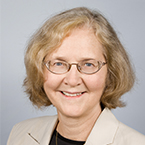
Dr. Elizabeth Blackburn, a 2009 Nobel Laureate in Physiology or Medicine, is widely recognized for her discovery of how chromosomes are protected by telomeres and for her discovery of the enzyme telomerase, which plays a key role in cell replication, cell aging, and human cancers. Her research has revolutionized the understanding of how cells function and has been called one of the most important discoveries in the field of molecular genetics.
Dr. Blackburn’s collaborative research showing how telomerase maintenance varies in humans, especially as a result of stress, has also led to current explorations of whether telomerase can be modulated to prolong cell life to treat age-related diseases, or deactivated to interrupt cancer. She has served on numerous national and international bodies, including the President’s Council on Bioethics, and has accepted eleven honorary doctorates from institutions worldwide.
Career Highlights
2017 Influencer of the Year, Next Avenue
2017 Alma Dea Morani M.D., Renaissance Woman Award
2010-2011 President, AACR
2010 Elected Fellow, Royal Society of New South Wales
2009 Nobel Prize in Physiology or Medicine
2007 Elected Member, Australian Academy of Science
2006-2009 Board of Directors, AACR
2006 Albert Lasker Award for Basic Medical Research
2005 Kirk A. Landon-AACR Prize for Basic Cancer Research
2003 Bristol-Myers Squibb Award for Distinguished Achievement in Cancer Research
2001 General Motors Alfred P. Sloan Award
2001 AACR-Pezcoller Award
2000 Elected Member, Institute of Medicine
2000 AACR-G.H.A. Clowes Memorial Award
1998 Australia Prize
1998 President, American Society for Cell Biology
1992 Elected Fellow of the Royal Society
1991 Elected Fellow, American Academy of Arts and Sciences
1975 PhD, University of Cambridge, UK